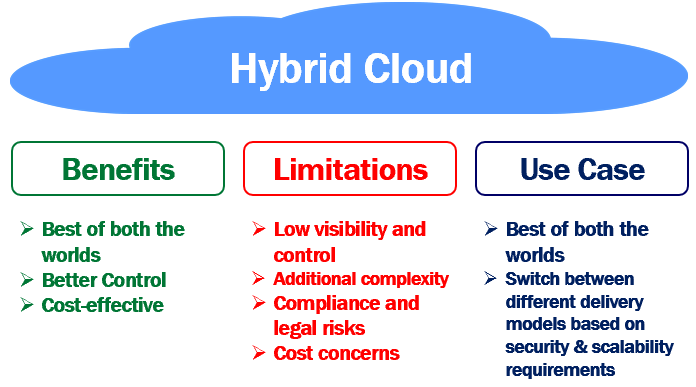A hybrid cloud is a computer and storage system that combines on-premises infrastructure, public cloud services, and/or private cloud services. Benefits Of Hybrid Cloud Services For Enterprise The different resources are coordinated to function as smoothly as possible. An organization may have the best of both worlds by implementing a hybrid cloud. They can employ cloud services where they are most effective while maintaining some operations in a private cloud or within their own on-premises network infrastructure. This makes more flexibility possible. Hybrid clouds come in a variety of forms, and it is crucial to protect your hybrid cloud environment no matter which option you select.
Benefits Of Hybrid Cloud Services For Enterprise
Architecture of Hybrid Clouds: How Do They Operate?
Hybrid cloud solutions are based on the idea that they include technologies from both public and private clouds. This gives an organization more freedom in determining how to best use its processing and storage resources.
The business is free to relocate that activity to their in-house data center or vice versa if, for instance, one application needs more processing power than another and the on-premises data center has more resources than the cloud side. Additionally, Infrastructure-as-a-Service (IaaS) may be included in a hybrid cloud system.
You basically buy an off-premises computer using IaaS, complete with random access memory (RAM), external drive space, and a central processor unit (CPU). Selecting the features you need to accomplish business goals without going over budget on those that are superfluous or redundant allows you to be picky about the setup's characteristics.
Environmental Types in Hybrid Clouds

A hybrid cloud architecture may consist of many types of cloud environments. An organization may decide to employ a variety of hybrid cloud computing services, depending on the needs of its IT system.
1. The public cloud
The term "public cloud" describes an IT configuration, such as OpenStack, where the infrastructure and processing power are managed by a third party. Multiple organizations share the resources via a public internet connection.
2. Private cloud on-site
Only one company uses the cloud infrastructure in a private, on-premises cloud, although it may have many business units using the resources. The hardware that makes up the cloud is stored on-site.
3. Private cloud hosting
An off-premises hosted private cloud is one that is physically located away from the company's site. A third party hosts and manages it.
4. Legacy on-premise
An internal data center supports the infrastructure, which is maintained on-premises in an on-premises legacy architecture. But cloud hosting services can also be connected to an on-premises legacy configuration.
What's the Difference Between Multi-Cloud and Hybrid Cloud?
Because hybrid clouds and multi-clouds both entail the simultaneous usage of various cloud solutions, it might be simple to mistake the two. But there are some significant distinctions. Both public and private solutions are constantly used in hybrid clouds.
A multi-cloud, on the other hand, always consists of many public clouds, although it may also contain physical and virtual infrastructure. Several clouds are given distinct jobs in a multi-cloud paradigm.
Nonetheless, a hybrid cloud's constituent parts typically cooperate with one another. In contrast to a multi-cloud configuration, where each process prefers to remain within its own cloud, this leads to processes and data coexisting and entwining within the hybrid environment.
Read also: Enterprise Software Solutions Development Company
Do Hybrid Clouds Offer Security?
Hybrid cloud architecture may improve the security profile of the entire organization when it is adequately safeguarded. You must, however, make sure that you can continue to see and manage the network and the security measures in place to safeguard it when selecting a security solution for a hybrid cloud environment.
Governance and compliance are also important considerations in several businesses, especially in the government, healthcare, finance, and other fields governed by laws.
Benefits of Hybrid Cloud Computing

When compared to other cloud-based or non-cloud-based solutions, a hybrid cloud is a better choice for a lot of businesses. Scalability, security, affordability, control, and speed are a few advantages.
1. The ability to scale
The cost of setting up, maintaining, and growing your infrastructure is one of the biggest challenges presented by a private network. Prior to the availability of cloud services, a business could not expand its IT system unless it had enough finances, sufficient to buy more physical equipment.
By employing a hybrid cloud configuration, public cloud alternatives make it simpler to operate more complicated and resource-demanding apps and add additional processing power. You may use the resources offered by the cloud service without having to wait till you have the money to purchase several additional servers.
2. Safety
By utilizing a hybrid cloud architecture, your company can benefit from both the power and possibilities that are usually associated with public clouds and the protection that comes with private clouds.
Applications, analytics systems, and other processes will probably still need to analyze and use the data that is kept in a private cloud environment before sending it to the public cloud.
Nonetheless, it is rather simple to employ encryption techniques in a hybrid cloud environment to guarantee that the data remains secure during this procedure. The IT staff has a number of choices with a hybrid cloud to make data storage and transit secure.
Read also: Enterprise Data Management Services
3. Price
Hybrid clouds frequently assist in reducing long-term expenses, giving an organization's budget more leeway. The business saves money as it grows since scaling a hybrid cloud higher is simpler and less costly. Additionally, because scaling is easier to achieve, the company may expand and start making more money sooner.
Growth may be impeded by solely on-site storage, which raises opportunity costs as the business loses out on possible revenue. Another significant consideration is that you may lower the potentially crippling expenses of moving digital assets between two separate cloud providers by keeping vital data in the private area of a hybrid cloud system.
For instance, you might have to pay termination costs before moving your data from one silo to another if you are utilizing a multi-cloud configuration. Benefits Of Hybrid Cloud Services For Enterprise Additionally, some cloud providers charge extra for data transfers. With a hybrid cloud infrastructure, these costs are avoided.
4. Command
One of the main advantages of a hybrid cloud system is control. You may tailor the private side of your cloud model to your organization's requirements rather than entrusting a third-party supplier with every aspect of your IT infrastructure. Other areas of your hybrid cloud could be devoted to less important or urgent work.
Additionally, a hybrid paradigm makes it simpler to modify which infrastructure components should manage each application and procedure. To achieve sufficient agility with a multi-cloud or completely on-site solution, you might need to sign new contracts with suppliers or buy new hardware. You control what you need to steer clear of these types of expensive or difficult procedures with a hybrid cloud.
5. Velocity
Improved speed is another benefit of keeping control over your network's resources. A hybrid cloud environment enables IT professionals to optimize the network in ways that lower latency and streamline the data transfer process, even if it is not by itself faster than a public or multi-cloud arrangement.
Additionally, you may leverage edge computing's capability in a hybrid environment to speed up your overall IT infrastructure. Private clouds can have their functions customized to make the most use of their resources, whereas public clouds are compelled to share their resources with their user base.
Critical processing time may be saved with this type of improved control, especially if each program is installed in an environment sector that is particularly tailored to its needs.
FAQ's: Benefits Of Hybrid Cloud Services For Enterprise
What are the benefits of using a hybrid cloud?
- Agility and scalability.
- Control and flexibility.
- Security.
- Compliance and regulatory requirements.
- Cost optimization.
- Business continuity and reliability.
- Innovation and transformation.
What is the benefit of the cloud to enterprises?
Cloud computing increases the flexibility of your company. Without making physical infrastructure investments, you may easily scale up storage and resources to meet business demands. The infrastructure required to sustain their maximum load levels does not need to be built or purchased by businesses.
What is the value of hybrid cloud?
By enabling enterprises to scale resources up or down in response to demand, hybrid cloud platforms facilitate seamless scaling. For businesses that are dealing with varying workloads, such as seasonal demand surges or general quick expansion, this scalability is very helpful.
What is a hybrid cloud enterprise?
A hybrid cloud, often referred to as a cloud hybrid, is a computing environment that permits the sharing of data and apps between a public cloud and an on-premises datacenter, also known as a private cloud.







